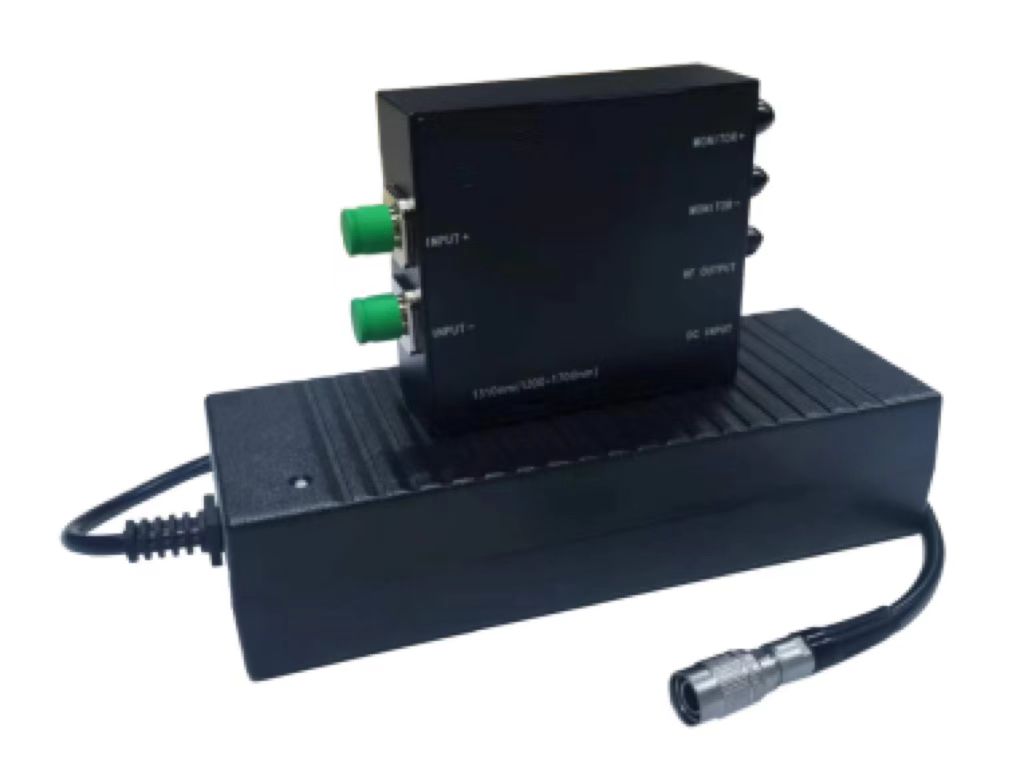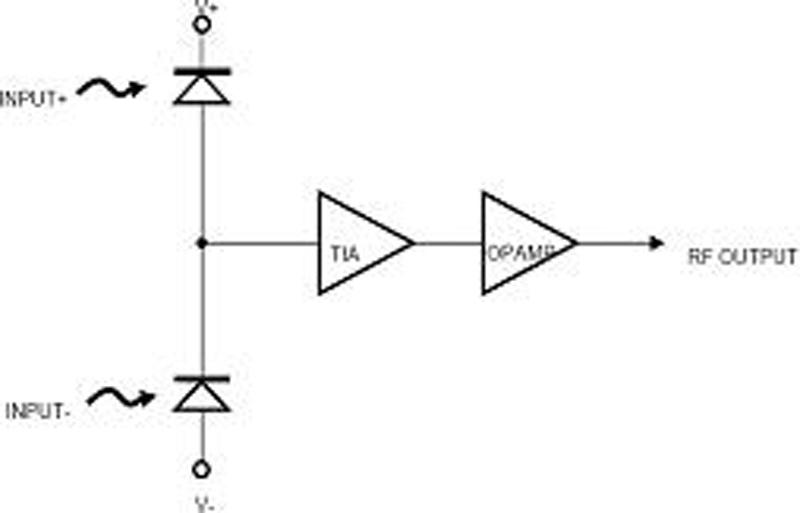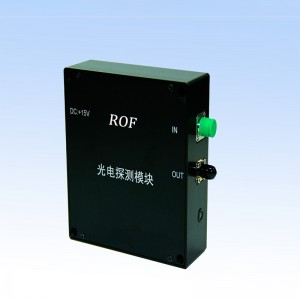ROF-BPR OCT systems High bandwidth fixed gain Balanced Photodetector Silicon Photodetector
Feature
Typical wavelength: 850/1064/1310/1550nm
3dB bandwidth: 400MHz/1GHz/1.6GHz
High common-mode rejection ratio: > 25dB
High gain: 150×103V/W

Application
⚫Heterodyne detection
⚫Optical delay measurement
⚫Optical fiber sensing system
⚫(OCT)
SS-OCT schematic diagram
Parameters
Performance parameters BPR-400MHz
| Model number |
ROF-BPR-400M-A2-FC-AC |
ROF-BPR-400M-A1-FC-AC |
| Spectral response range |
1200-1700nm |
900-1400 |
| Typical wavelength |
1310nm/1550nm |
1064nm |
| responsivity |
0.9A/W@1550nm |
0.7A/W@1064nm |
| 3dB bandwidth |
10KHz-400MHz |
10KHz-400MHz |
| Common-mode rejection ratio CMRR |
>25dB(30dB typ.) |
>25dB(30dB typ.) |
| Gain @ High resistance state |
14×103V/W |
10×103V/W |
| Noise voltage (RMS) |
<5mVRMS |
<5mVRMS |
| Saturated optical power |
400mW |
800mW |
| Maximum output amplitude @ High resistance |
5Vpp |
5Vpp |
| Damaged optical power |
10mW |
|
| Operating temperature range |
-20~+70 ℃ |
|
| Operating voltage |
DC ±12V (with low noise power adapter) |
|
| Working current |
60mA |
|
| Input connector |
FC |
|
| Output connector |
SMA |
|
| Output impedance |
50 ohms |
|
| Output coupling mode |
AC coupling (DC optional) |
|
| Overall dimensions (mm) |
78.5 mm * 71 mm * 25.7 mm |
|
Performance parameters BPR-1GHz
| Model number |
ROF-BPR-1G-A2-FC |
ROF-BPR-1G-A1-FC |
| Spectral response range |
1200-1700nm |
900-1400 |
| Typical wavelength |
1310nm/1550nm |
1064nm |
| responsivity |
0.9A/W@1550nm |
0.7A/W@1064nm |
| 3dB bandwidth |
500K-1GHz |
500K-1GHz |
| Common-mode rejection ratio CMRR |
>25dB(30dB typ.) |
>25dB(30dB typ.) |
| Gain @ High resistance state |
36×103V/W |
28×103V/W |
| Noise voltage (RMS) |
<8mVRMS |
<8mVRMS |
| Saturated optical power |
380mW |
500mW |
| Maximum output amplitude @50Ω |
3.5Vpp |
3.5Vpp |
| Damaged optical power |
10mW |
|
| Operating temperature range |
-20~+70 ℃ |
|
| Operating voltage |
DC ±12V (with low noise power adapter) |
|
| Working current |
200mA |
|
| Input connector |
FC |
|
| Output connector |
SMA |
|
| Output impedance |
50 ohms |
|
| Output coupling mode |
AC coupling |
|
| Overall dimensions (mm) |
78.5 mm * 71 mm * 25.7 mm |
|
Performance parameters BPR-1.6GHz
| Model number |
ROF-BPR-1.6G-A2-FC |
ROF-BPR-1.6G-A1-FC |
| Spectral response range |
1200-1700nm |
900-1400 |
| Typical wavelength |
1310nm/1550nm |
1064nm |
| responsivity |
0.9A/W@1550nm |
0.7A/W@1064nm |
| 3dB bandwidth |
500K-1.6GHz |
500K-1.6GHz |
| Common-mode rejection ratio CMRR |
>25dB(30dB typ.) |
>25dB(30dB typ.) |
| Gain @ High resistance state |
16×103V/W |
11×103V/W |
| Noise voltage (RMS) |
<10mVRMS |
<10mVRMS |
| Saturated optical power |
800mW |
1mW |
| Maximum output amplitude @50Ω |
3Vpp |
3Vpp |
| Damaged optical power |
10mW |
|
| Operating temperature range |
-20~+70 ℃ |
|
| Operating voltage |
DC ±12V (with low noise power adapter) |
|
| Working current |
350mA |
|
| Input connector |
FC |
|
| Output connector |
SMA |
|
| Output impedance |
50 ohms |
|
| Output coupling mode |
AC coupling |
|
| Overall dimensions (mm) |
78.5 mm * 71 mm * 25.7 mm |
|
Monitor indicator
| Monitor |
ROF-BPR-XX-A2 |
ROF-BPR-XX-A1 |
|
| Operating bandwidth |
DC-5MHz |
||
| Conversion gain |
10×103V/W |
7×103V/W |
|
| Noise voltage (RMS) |
5mVpp |
||
| Output impedance |
200 ohms |
||
| Output amplitude |
10Vpp |
||
Curve
Characteristic curve

Spectral response curve Internal circuit diagram
Dimensions(mm)
Information
Ordering information
|
ROF |
XXX |
XX |
X |
XX |
XX |
X |
| BPR-- Fixed gain balanced detectorGBPR-- Gain adjustable balance detector | -3dB bandwidth:10M---10MHz
80M---80MHz 200M---200MHz 350M---350MHz 400M---400MHz 1G---1GHz 1.6G---1.6GHz
|
Operating wavelength:A---850~1650nm
(1550nm test) B---320~1000nm (850nm test) A1---900~1400nm (1064nm test) A2---1200~1700nm (1310nm or 1550nm test) |
Input type:FC----Fiber coupling
FS----Free space |
Coupling type:DC---DC Coupling AC---AC Coupling |
Gain type:Null-- Normal gain
H--High gain requirement |
Note:
1,10 M, 80MHz, 200MHz, 350MHz and 400 MHZ bandwidth detectors support operating bands A and B; Coupling Type Both AC and DC coupling are optional.
2, 1GHz, 1.6GHz, support working bands A1 and A2; Coupling type Only AC coupling is supported.
3, the gain is adjustable (150MHz) to support the working band A and B; Coupling Type Both AC and DC coupling are optional.
4, example, ROF-BPR-350M-A-FC-AC: 350MHz fixed gain balanced probe module, operating wavelength 1550nm(850-1650nm), AC coupled output.
* please contact our seller if you have special requirements
About Us
Rofea Optoelectronics exhibits a wide range of electro-optic products including modulators, photodetectors, laser sources, dfb lasers, optical amplifiers, EDFAs, SLD lasers, QPSK modulation, pulsed lasers, photodetectors, balanced photodetectors, semiconductor lasers, laser Drivers, fiber couplers, pulsed lasers, fiber amplifiers, optical power meters, broadband lasers, tunable lasers, optical delays, electro-optic modulators, photodetectors, laser diode drivers, fiber amplifiers, erbium-doped fiber amplifiers, and source lasers.
We also provide custom modulators, including 1*4 array phase modulators, ultra-low Vpi and ultra-high extinction ratio modulators, which are specially designed for universities and research institutes.
These products feature electro-optic bandwidth up to 40 GHz, wavelength range from 780 nm to 2000 nm, low insertion loss, low Vp, and high PER, making them suitable for a variety of analog RF links and high-speed communication applications.
Rofea Optoelectronics offers a product line of commercial Electro-optic modulators, Phase modulators, Intensity modulator, Photodetectors, Laser light sources, DFB lasers,Optical amplifiers, EDFA, SLD laser, QPSK modulation, Pulse laser, Light detector, Balanced photodetector, Laser driver, Fiber optic amplifier, Optical power meter, Broadband laser, Tunable laser, Optical detector, Laser diode driver, Fiber amplifier. We also provide many particular modulators for customization, such as 1*4 array phase modulators, ultra-low Vpi, and ultra-high extinction ratio modulators, primarily used in universities and institutes.
Hope our products will be helpful to you and your research.















